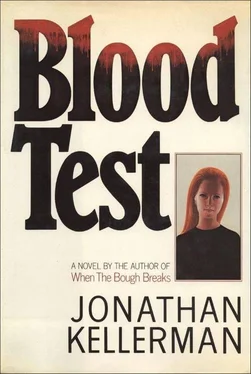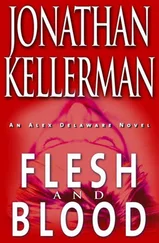Jonathan Kellerman - Blood Test
Здесь есть возможность читать онлайн «Jonathan Kellerman - Blood Test» весь текст электронной книги совершенно бесплатно (целиком полную версию без сокращений). В некоторых случаях можно слушать аудио, скачать через торрент в формате fb2 и присутствует краткое содержание. Город: New York, Год выпуска: 1986, ISBN: 1986, Издательство: Atheneum, Жанр: Триллер, на английском языке. Описание произведения, (предисловие) а так же отзывы посетителей доступны на портале библиотеки ЛибКат.
- Название:Blood Test
- Автор:
- Издательство:Atheneum
- Жанр:
- Год:1986
- Город:New York
- ISBN:978-0689116346
- Рейтинг книги:4 / 5. Голосов: 1
-
Избранное:Добавить в избранное
- Отзывы:
-
Ваша оценка:
- 80
- 1
- 2
- 3
- 4
- 5
Blood Test: краткое содержание, описание и аннотация
Предлагаем к чтению аннотацию, описание, краткое содержание или предисловие (зависит от того, что написал сам автор книги «Blood Test»). Если вы не нашли необходимую информацию о книге — напишите в комментариях, мы постараемся отыскать её.
Blood Test — читать онлайн бесплатно полную книгу (весь текст) целиком
Ниже представлен текст книги, разбитый по страницам. Система сохранения места последней прочитанной страницы, позволяет с удобством читать онлайн бесплатно книгу «Blood Test», без необходимости каждый раз заново искать на чём Вы остановились. Поставьте закладку, и сможете в любой момент перейти на страницу, на которой закончили чтение.
Интервал:
Закладка:
The mountains hovered above us, grim hulking masses of shadow. Maimon’s truck was old and it lurched as he shifted into low gear and began the climb into the foothills. I stayed several car-lengths behind and trailed him into darkness so dense it was palpable.
We climbed for miles, finally reaching a plateau. The road veered sharply to the right. To the left was a broad mesa surrounded by chain-link fence. Pyramidal towers rose from the flatlands, skeletal and still. The abandoned oilfields. Maimon turned away from them and resumed the ascent.
The next few miles were groves, unbroken stretches of trees recognizable as such by the serrated silhouette of star-kissed leaves, shiny satin against the velvet of the sky. Citrus, from the perfume in the air. Then came a series of homesteads, farmhouses on one-acre plots shadowed by sycamore and oak. The few lights that were on blurred as we drove by.
Maimon’s turn signal went on two hundred feet before he swung left through an open gate. An unobtrusive sign said RARE FRUIT AND SEED co. He pulled up in front of a big two-story frame house girdled by a wide porch. On the porch were two chairs and a dog. The dog rose on its haunches and nuzzled Maimon’s hand as he climbed out of the truck. A Labrador, heavy and stolid, seemingly unimpressed by my presence. Its master petted it and it went back to sleep.
“Come around to the back,” said Maimon. We walked along the left side of the house. There was an electrical junction box hanging from the rear wall. He opened it, flicked a switch, and a series of lights came on in sequence, as if choreographed.
What unfolded before my eyes was as textured and verdant as a painting by Rousseau. A masterpiece entitled Variations on the Theme of Green.
There were plants and trees everywhere, many in bloom, all thick with foliage. The larger ones sat in five and fifteen gallon containers, a few were rooted in the rich dark soil. Smaller plants and seedlings in peat pots rested on tables shielded by canopies of mesh. Beyond the canopies were three glass greenhouses. The air was a cocktail of mulch and nectar.
He gave me a guided tour. Initially I recognized most of the species but found the varieties novel. There were unusual strains of peach, nectarine, apricot, plum, low-chill apples, and pears. Several dozen fig trees in pots were lined up against a fence. Maimon picked two figs from one of them, handed one to me and popped the other in his mouth. I’d never cared for raw figs but ate the fruit to oblige him. I was glad I did.
“What do you think?”
“Wonderful. Tastes like a dried fig.”
He was pleased.
“Celeste. Best taster by my standards, though some prefer Pasquale.”
It continued like that, Maimon pointing out choice hybrids with unconcealed pride, sometimes stopping to pick one and offer me a taste. His fruit was unlike anything I’d found on the produce shelves, larger, juicier, more vividly colored and intensely flavored.
Finally we came to the exotic specimens. Many were aflame with orchidlike blossoms in shades of yellow, pink, scarlet, and mauve. Each group of plants was accompanied by a wooden sign staked into the ground. On the sign was a color photograph of fruit, flower, and leaf. Under the illustration were botanical and common names in neatly lettered text, along with geographic, horticultural, and culinary details.
There were species with which I was vaguely familiar — litchies, unusual varieties of mango and papaya, loquats, guavas, and passion fruits — and many others I’d never known existed — sapotes, sapodillas, acerola cherries, jujubes, jaboticaba, tamarinds, tree tomatoes.
One section was devoted to vines — grapes, kiwis, raspberries hued from black to gold. In another, stocked with rare citrus, I saw Chandler pommelos three times the size of grapefruit and sugary sweet, Moro, Sanguinelli, and Tarocco blood oranges with pulp and juice the color of burgundy wine, tangors, limequats, sweet limes, and Buddha’s Finger citrons resembling eight-digited human hands.
The greenhouses protected seedlings of the most fragile plants in the collection, those Maimon had obtained from young adventurers who explored the remote tropical regions of the world for new species of flora. By manipulating light, heat, and moisture he’d constructed microclimates that assured high success in propagation. He became animated as he described his work, tossing out esoterica followed by patient explanations.
Half of the last greenhouse was given over to stacks of carefully labeled boxes. On the table were a postage meter, scissors, tape, and padded envelopes.
“Seeds,” he said. “The mainstay of my business. I ship all over the world.”
He held open the door and took me to a cluster of small trees.
“Family annonaceae.” He poked among the leaves of the first tree and uncovered a large yellow-green fruit covered with fleshy spines. “Annona muricata , the soursop. And this red one is Annona reticulata , the custard apple, Lindstroms variety. There are no fruit on this one here, won’t be until August — Annona squamosa , sweet-sop or custard apple, seedless Brazilian variety. And these,” he indicated half a dozen trees with drooping, elliptical leaves, “are the cherimoyas. Right now I’ve got several varieties — Booth, Bonita, Pierce, White, Deliciosa.”
I reached out and touched a leaf. The underside was fuzzy. An orangelike scent issued forth.
“Lovely fragrance, isn’t it?” More probing among the branches. “This is the fruit.”
It didn’t look like the stuff of which dreams were made — a large, globose, heart-shaped mound, pale green and dotted with protrusions, resembling a leathery green pine cone. I touched it gingerly. Firm and gently abrasive.
“Come inside. I’ll open a ripe one.”
His kitchen was big and old and spotless. The refrigerator, oven, and sink were white enamel, the floor, linoleum waxed to a gleam. A table and chairs fashioned from rock maple occupied the center. I pulled up a chair and sat down. The big Lab had moved indoors and lay snoring at the base of the stove.
Maimon opened the refrigerator, pulled out a cherimoya, and brought it, two bowls, two spoons, and a knife, to the table. The ripe fruit was mottled with brown and soft to the touch. He sliced it in two, put each half in a bowl, skin down. The pulp was a creamy off-white, the color and consistency of fresh custard.
“Dessert,” said Maimon and spooned out a shimmering mouthful. He held it aloft then ate.
I put my spoon to the fruit. It slid in and sank. I pulled it out filled with custard and put it to my lips.
The taste was incredible, bringing to mind the flavors of many other fruits yet different from each; sweet, then tart, then sweet again, shifting elusively on the tongue, as subtle and satisfying as the finest confection. The seeds were plentiful, beanlike and hard as wood. An annoyance, but tolerable.
We ate in silence. I savored the cherimoya, knowing it had brought heartbreak to the Swopes, but not permitting that to adulterate my pleasure until all that was left was an empty green shell.
Maimon ate slowly and finished a few minutes later.
“Delicious,” I said when he put down his spoon. “Where can you get them?”
“Generally two places. At Hispanic markets they’re comparatively cheap but the fruit is small and irregular. If you go to a gourmet grocer you’ll pay fifteen dollars for two good-sized ones wrapped in fancy tissue paper.”
“So they’re being grown commercially?”
“In Latin America and Spain. On a more limited basis here in the U.S., mostly up near Carpenteria. The climate there’s too cool for true tropicals but it’s even more temperate than what we get down here.”
Читать дальшеИнтервал:
Закладка:
Похожие книги на «Blood Test»
Представляем Вашему вниманию похожие книги на «Blood Test» списком для выбора. Мы отобрали схожую по названию и смыслу литературу в надежде предоставить читателям больше вариантов отыскать новые, интересные, ещё непрочитанные произведения.
Обсуждение, отзывы о книге «Blood Test» и просто собственные мнения читателей. Оставьте ваши комментарии, напишите, что Вы думаете о произведении, его смысле или главных героях. Укажите что конкретно понравилось, а что нет, и почему Вы так считаете.












